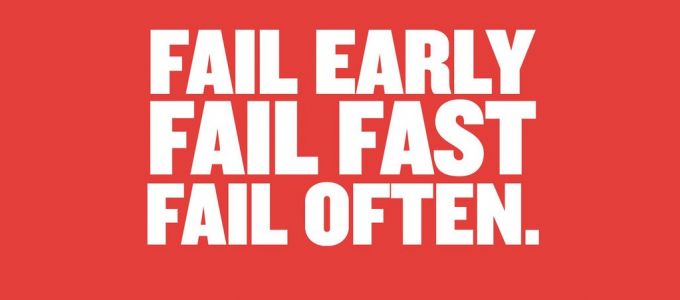Fail fast, fail often, fail forward
Does the (un)official startup mantra do more harm than help?
By Emma Broholm
“Fail fast, fail often, fail forward” has become the unofficial mantra of the startup culture, especially in places like Silicon Valley. It entails the idea that failure is not just a part of the process of running a business, but instead is a necessary part of running a business; that it is actually beneficial to your career. It underrides the notion that businesses should undertake bold experiments to determine the long-term viability of a product or strategy, rather than proceeding cautiously and investing years in a “doomed approach”. The idea started gaining traction in 2001, but took off in 2009, when FailCon, a conference about “embracing failure” launched in San Francisco. FailCon has now become an annual event, with other cities across the world hosting their own versions. The mantra seems to have grown faster than the next big startup. In this article we consider why has it grown so much? What are the perceived benefits of failing fast, failing often, failing forward?
Failure is considered the way to determine what does and does not work when it comes to your business. It is impossible to predict how a product is going to fare outside the production process and in the real world. Thus, it is necessary to test your product to know if it will succeed. This is common knowledge. However, what the fail fast mantra preaches is that if you should fail, you should fail sooner rather than later. This way, you can get out before you’ve spent a lot of time and money on a failing business. Furthermore, the mantra teaches people how to embrace failure as opposed to letting it hold them back from creating new and, possibly better businesses.
In theory, this makes a lot of sense, but there are actually a few problems with the fail fast, fail often, fail forward approach. These problems are often overlooked by its fans. The first, and by far the most important problem, is that mistakes and failures are used interchangeably. Failure literally means the “lack of success.” A mistake, on the other hand, is “an act or judgment that is misguided or wrong.” Mistakes are an integral part of setting up a business. Mistakes are made to learn from. It’s what you take away from those mistakes, that ensures you don’t make them again. However, this is not what fail fast teaches entrepreneurs.
The “fail fast” mantra assumes that you and your organization will fail, or that you will not succeed. While making mistakes allows you and your business to grow and learn from your mistakes for the better, failure entails the end of your business completely. Fail fast teaches entrepreneurs that failure is not just acceptable but encouraged; in some instanced even strived for. Failure is part of life. It’s better to have tried and failed, then to have never tried at all. However, failure is not something any entrepreneur sets out to do. Failure is not the goal. It is something that can happen if you don’t recognize and learn from the mistakes you’ve made.
The three parts of “fail fast, fail often, fail forward” mantra are so inherently different that they don’t work well together and actually detract from the lessons you can learn from them.
- Fail fast entails the idea that if you must fail, do so early in the production process, so you do not waste too much time or money. However, this implies that failing is inevitable, which does not have to be the case. Furthermore, sometimes failing does not happen until later in the process. Fail fast mainly happens during product testing. But if mistakes are discovered later, then the whole purpose of “fail fast” will have been for not, as you will still have invested time and money. However, this can still be a valuable learning experience, even if it does not comply with fail fast.
- Fail often is the least discussed point of the mantra and for good reason. It seems to entail that an entrepreneur needs to make many mistakes to establish what works and what does not. However, as discussed above; mistakes and failures are not synonymous. Making mistakes is indeed necessary, in fact it is practically inevitable. Failure, or the downfall of your company, however, does not and should not happen often. Discovering why a product does not work is an integral part of being an entrepreneur, but having it result in the demise of your company, is not integral and may be devastating to the individual entrepreneur or founder.
- Fail forward is potentially the most helpful element of the mantra for entrepreneurs. Fail forward entails that if one must fail, one should learn from their failure. You learn and gain from the experience; negative or positive.
Nonetheless, it may be beneficial to drop the, “fail fast, fail often, fail forward” slogan, to take away the focus on failing, and rather focus on learning from one's mistakes. Even if you do make a mistake, it does not mean that you have failed. Instead, focus on launching and learning.
Header Image Courtesy of: Flickr
Emma Broholm graduated from Leiden University with a degree in Law. She is currently an intern with Child and Youth Finance International. She is an alumni of the European Youth Parliament and has previously had articles published in Microfinance Gateway.
